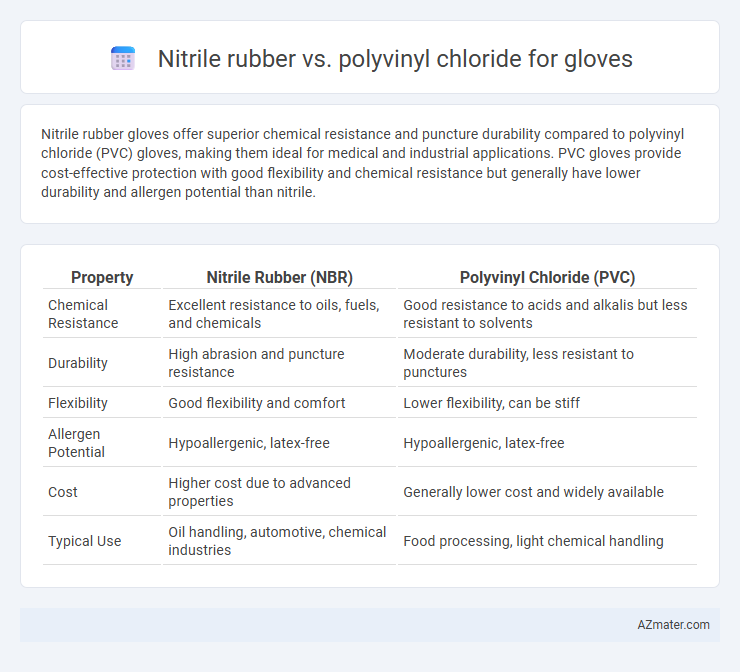Nitrile rubber gloves offer superior chemical resistance and puncture durability compared to polyvinyl chloride (PVC) gloves, making them ideal for medical and industrial applications. PVC gloves provide cost-effective protection with good flexibility and chemical resistance but generally have lower durability and allergen potential than nitrile.
Table of Comparison
| Property | Nitrile Rubber (NBR) | Polyvinyl Chloride (PVC) |
|---|---|---|
| Chemical Resistance | Excellent resistance to oils, fuels, and chemicals | Good resistance to acids and alkalis but less resistant to solvents |
| Durability | High abrasion and puncture resistance | Moderate durability, less resistant to punctures |
| Flexibility | Good flexibility and comfort | Lower flexibility, can be stiff |
| Allergen Potential | Hypoallergenic, latex-free | Hypoallergenic, latex-free |
| Cost | Higher cost due to advanced properties | Generally lower cost and widely available |
| Typical Use | Oil handling, automotive, chemical industries | Food processing, light chemical handling |
Overview of Nitrile Rubber and Polyvinyl Chloride Gloves
Nitrile rubber gloves offer superior chemical resistance, puncture protection, and allergen-free properties, making them ideal for medical and industrial applications. Polyvinyl chloride (PVC) gloves provide cost-effective barrier protection with moderate chemical resistance and are frequently used in food handling and light industrial tasks. Both materials serve distinct roles, with nitrile excelling in durability and safety standards, while PVC emphasizes affordability and flexibility.
Material Composition: Nitrile Rubber vs PVC
Nitrile rubber gloves are made from synthetic copolymers of acrylonitrile and butadiene, providing high chemical resistance and puncture durability. Polyvinyl chloride (PVC) gloves consist of polymerized vinyl chloride monomers with added plasticizers, resulting in a flexible but less elastic material. The chemical structure of nitrile rubber offers superior resistance to oils, solvents, and chemicals compared to the more rigid and less chemically resistant PVC composition.
Chemical Resistance Comparison
Nitrile rubber gloves exhibit superior chemical resistance compared to polyvinyl chloride (PVC) gloves, particularly against oils, fuels, and various solvents, making them ideal for handling hydrocarbons and aggressive chemicals. PVC gloves provide moderate resistance to acids, alkalis, and certain chemicals but tend to degrade faster when exposed to organic solvents and oils. The molecular structure of nitrile polymers offers enhanced durability and protection in industrial and laboratory environments requiring prolonged exposure to chemicals.
Comfort and Fit: Which Is Superior?
Nitrile rubber gloves offer superior comfort and fit due to their high elasticity and form-fitting properties, allowing for enhanced dexterity and reduced hand fatigue during extended use. Polyvinyl chloride (PVC) gloves tend to be less flexible and more rigid, often resulting in a looser fit that can impair tactile sensitivity and overall comfort. Therefore, nitrile rubber gloves are generally the preferred choice for applications where comfort and precise hand movement are critical.
Durability and Strength: Nitrile vs PVC Gloves
Nitrile gloves offer superior durability and puncture resistance compared to PVC gloves, making them ideal for tasks requiring high mechanical strength. The synthetic rubber structure of nitrile provides excellent elasticity and tear resistance, whereas PVC gloves tend to be more rigid and prone to cracking under stress. In industrial and medical settings where glove integrity is critical, nitrile gloves outperform PVC gloves in maintaining strength and preventing breaches.
Allergen and Sensitivity Considerations
Nitrile rubber gloves offer superior hypoallergenic properties compared to polyvinyl chloride (PVC) gloves, significantly reducing the risk of allergic reactions and skin sensitivity in users. PVC gloves may contain additives such as plasticizers and stabilizers that can cause irritation or contact dermatitis, especially in individuals with sensitive skin or pre-existing allergies. Choosing nitrile gloves is preferable for healthcare and food service industries where minimizing allergen exposure and maintaining skin health is critical.
Applications in Different Industries
Nitrile rubber gloves provide superior chemical resistance, making them ideal for use in automotive, pharmaceutical, and laboratory settings where exposure to oils, solvents, and hazardous chemicals is common. Polyvinyl chloride (PVC) gloves are frequently used in food processing, janitorial work, and medical examinations due to their excellent barrier against water-based fluids and affordability. Industries requiring excellent puncture resistance and hypoallergenic properties often prefer nitrile, while PVC gloves are favored for lightweight tasks and environments with low chemical exposure.
Environmental Impact and Sustainability
Nitrile rubber gloves exhibit greater environmental sustainability than polyvinyl chloride (PVC) gloves due to their biodegradability and lower release of hazardous chemicals during production and disposal. PVC gloves contribute significantly to environmental pollution through the release of dioxins and phthalates, which are persistent organic pollutants harmful to ecosystems and human health. The energy-intensive manufacturing and non-biodegradable nature of PVC increase its carbon footprint, whereas nitrile rubber offers a more eco-friendly alternative with reduced ecological impact.
Cost Effectiveness and Availability
Nitrile rubber gloves typically offer greater cost-effectiveness due to their durability and resistance to punctures, extending glove lifespan in industrial and medical settings. Polyvinyl chloride (PVC) gloves are generally less expensive upfront and widely available, making them a budget-friendly option for low-risk tasks. However, PVC gloves' lower chemical and abrasion resistance often result in more frequent replacements, impacting overall cost efficiency compared to nitrile.
Choosing the Right Glove for Your Needs
Nitrile rubber gloves offer superior chemical resistance and puncture durability, making them ideal for medical and industrial applications requiring protection against oils, solvents, and hazardous substances. Polyvinyl chloride (PVC) gloves provide excellent affordability and flexibility, suitable for general-purpose tasks such as food handling and light cleaning where corrosive risks are minimal. Selecting the right glove depends on the specific hazards encountered, with nitrile preferred for robust protection and PVC favored for cost-effective, everyday use.

Infographic: Nitrile rubber vs Polyvinyl chloride for Glove
 azmater.com
azmater.com